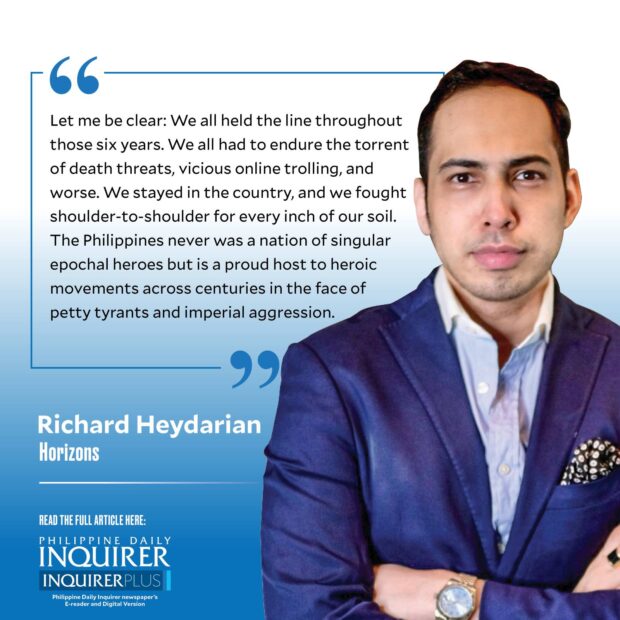Why the WPS arbitration award is a victory
 Last week felt special. A profound sense of vindication was in the air. The seventh anniversary of the Philippines’ historic arbitration award, hosted by the ADR-Stratbase Institute at the Manila Polo Club, was both festive and triumphant. Dignitaries from all major allies and partners were in attendance. And so were leading policymakers, experts, and advocates who tirelessly defended the Philippines’ sovereign rights. The mood was unlike any of the previous anniversaries, which coincided with the tenure of the most unabashedly pro-Beijing president in Philippine (if not Southeast Asian) history.
Last week felt special. A profound sense of vindication was in the air. The seventh anniversary of the Philippines’ historic arbitration award, hosted by the ADR-Stratbase Institute at the Manila Polo Club, was both festive and triumphant. Dignitaries from all major allies and partners were in attendance. And so were leading policymakers, experts, and advocates who tirelessly defended the Philippines’ sovereign rights. The mood was unlike any of the previous anniversaries, which coincided with the tenure of the most unabashedly pro-Beijing president in Philippine (if not Southeast Asian) history.
Lest we forget, former president Rodrigo Duterte was shamelessly slavish in his foreign policy rhetoric vis-à-vis China. Here was a mayor-turned-president, who openly called on regional states to be “meek” and “humble” in exchange for Beijing’s “mercy.” This is the same president who repeatedly emphasized how much he “loves” China, which will “protect me” from any potential threat to his rule.
This is the same president who repeatedly bashed the West for its misdeeds centuries earlier, while seamlessly parroting Beijing’s line whenever Filipino fishermen were harassed, or worse, under his own watch. In what universe is such embarrassingly self-indulgent kowtow tantamount to an “independent foreign policy”? Apparently, this stance was good enough to win him the Promoting Philippines-China Understanding (APPCU) awards.
But just as depressing and demoralizing were the chorus of apologists, who tried to spin Duterte’s slavish “predistortion” toward Beijing. For six straight years, the former demagogue in Malacañang, and his army of impresarios, gaslighted any patriot standing up to the brazen bullying in the West Philippine Sea as “warmonger.” In the former president’s bizarrely amateurish strategic calculus, our strategic options were either fatalism (“Wala tayong magagawa”) or risking “suicidal” conflict. Apparently, for the former mayor, neither “hedging” nor “balancing”—a standard practice among our neighbors—was an option.
Against this backdrop, last week’s event, marking the anniversary of the arbitration award, was a perfect homage to all the patriots who collectively resisted the worst instincts of both Duterte and his strategic patron, most notably the late Philippine foreign affairs secretary Albert del Rosario. In attendance were also a whole host of other patriots—including former Supreme Court associate justice Antonio Carpio, Ambassador Henry Bensurto, and professors Dindo Manhit and Renato de Castro—who never shied away from standing up to bullies in the name of our national interest.
Contrary to conventional opinion in international media, the Duterte era spawned courageous resistance not only from a single journalist or media organization but from a whole patriotic-democratic movement. Let me be clear: We all held the line throughout those six years. We all had to endure the torrent of death threats, vicious online trolling, and worse. We stayed in the country, and we fought shoulder-to-shoulder for every inch of our soil. The Philippines never was a nation of singular epochal heroes but is a proud host to heroic movements across centuries in the face of petty tyrants and imperial aggression.
Thanks to a toxic cocktail of disinformation and sheer ignorance, however, many folks have yet to fully appreciate the value of the arbitration award, which both Duterte and China have dismissed as “just a piece of [waste] paper.”
Dear reader, let me briefly explain the three major strategic advantages the arbitration award conferred on the Philippines. First of all, Beijing’s legal defeat in 2016 was so thorough that it never bothered to invoke the anachronistic “nine-dash line” in its official statements again. Its subsequent legal acrobatics, most notably “four sha,” ended up as a laughingstock overseas. Second, the arbitration award provided both the legal pretext as well as a strategic impetus for not only the United States but also other major naval powers to step up their “freedom of navigation and overflight” patrols in the South China Sea lest the area transforms into “China’s Lake.” And lastly, the arbitration award pressured the Association of Southeast Asian Nations to resist efforts by China to impose its own version of international law in the ongoing Code of Conduct negotiations. For me, however, the most important contribution of the arbitration award was not only giving us diplomatic leverage with China, which hardly reciprocated Duterte’s years-long subservience but also reawakening an enduring sense of patriotism in the Filipino heart.
—————–
rheydarian@inquirer.com.ph
For comprehensive coverage, in-depth analysis, visit our special page for West Philippine Sea updates. Stay informed with articles, videos, and expert opinions.




















